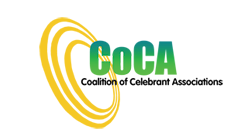Essential skills:
It is critical that the candidate demonstrate the ability to:
- Conduct an effective ceremony including use of additional materials
- Facilitate ceremonies in a manner that demonstrates cultural and social respect
- Incorporate visual and performing arts in ceremony and ritual appropriately in a manner that addresses client needs
- Manage ceremonies consistent with the celebrant's responsibility towards the value of ceremony, ritual and symbolism
- Personalise a ceremony or ritual to address specific identified client needs
- Research internet and other sources for ceremony and celebrant related information and resources and support
In addition, the candidate must be able to effectively do the task outlined in elements and performance criteria of this unit, manage the task and manage contingencies in the context of the identified work role
These include the ability to:
- Adhere to all required legislation
- Deliver the agreed format and content of the ceremony
- Determine and understand client needs and assist clients to feel at ease
- Determine content for ceremony, distinguishing between appropriate religious and civil ceremony content in line with client requirements
- Demonstrate effective communication skills, including:
- speaking in public
- speaking in a firm, diplomatic and culturally appropriate manner
- provide clear information, listen to and understand the needs of clients, and clarify ceremony instructions
- maintain awareness of and sensitivity to clients needs (e.g. demonstrate sensitivity to issues of ethnic, religious beliefs, cultural background, language levels, personal capabilities of clients)
- confirm procedures with translator as necessary
Ability to:
- Complete essential legal documents accurately
- Consider and provide appropriate acknowledgement of 'First Australians' and/ or 'Welcome to Country' and any other persons or groups relevant to the place and provision of the ceremony
- literacy competence to satisfactorily fulfil the role of a celebrant including the ability to interpret legal requirements
- using appropriate ritual and symbols in ceremony
- language competence to provide clear information, listen to and understand the needs of clients and clarify ceremony instructions
- succinct and clear written expression, in a style that addresses its purpose and suits audience needs
Demonstrate effective presentation skills, including:
- presenting materials for ceremony professionally
- controlling assembly of clients and guests with discretion
- projecting voice effectively before an audience
- demonstrating discretion in terms of any perceived or actual disruption during ceremony
- conducting ceremony with flow and continuity
- demonstrating respect and courtesy to clients, guests and other participants (i.e. photographer, musicians, translator) before, during and following the ceremony
- conveying an attitude of professionalism and compassion
- using effective problem solving skills to clarify any legal or other business issues arising
Demonstrate management and administrative skills, including:
- using effective techniques for monitoring own service area including client satisfaction
- applying numeracy skills including satisfactory record-keeping
- providing honest and open information re fees and monies refundable and in what circumstances
- ensuring arrival at venue at agreed time
- Provide ceremony resources that are varied, presentable and well maintained
- Refer persons to appropriate authority for further information
- Research, develop and maintain a data base of appropriate poetry, prose, symbols, music, ceremony accessories, and other ceremony content for a range of ceremonies and clients
- Recognise and act upon opportunities to enhance sustainability
- Use celebrant support services such as Attorney-General's Department, state and territory registries of births, deaths and marriages, celebrant associations or religious affiliations as appropriate
- Use verbal and non-verbal skills to initiate and sustain participant engagement
- Work with culturally diverse people in a 'celebrancy' context and demonstrate understanding of the role of various kinds of ceremony such as marriage or funeral ceremonies, in different cultural contexts
Essential skills:
It is critical that the candidate demonstrate the ability to:
- Determine and understand client needs and expectations and assist clients to feel at ease
- Demonstrate effective communication skills, including:
- maintaining awareness of and sensitivity to clients needs (e.g. sensitivity to issues of ethnic, religious beliefs, cultural background, language levels, personal capabilities of clients)
- confirming procedures with translator as necessary Identify client needs and expectations and match available services to address those needs, in conjunction with the client
- Demonstrate respect and courtesy to clients
In addition, the candidate must be able to effectively do the task outlined in elements and performance criteria of this unit, manage the task and manage contingencies in the context of the identified work role
These include the ability to:
- Personalise a ceremony or ritual to address specific identified client needs and expectations
- Demonstrate language and literacy competence, including:
- Literacy competence to satisfactorily fulfil the role of a celebrant including the ability to interpret legal requirements
- language competence to provide clear information, listen to and understand the needs of clients and clarify ceremony instructions
- Convey an attitude of professionalism and compassion
- Use effective problem solving skills to clarify any legal or other business issues arising


